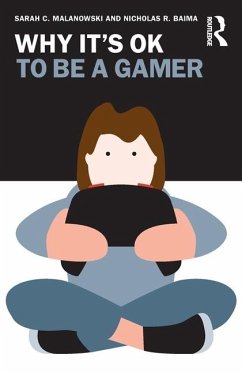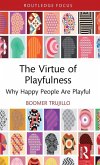If you enjoy video games as a pastime, you are certainly not alone-billions of people worldwide now play video games. However, you may still find yourself reluctant to tell others this fact about yourself. After all, we are routinely warned that video games have the potential to cause addiction and violence. And when we aren't being warned of their outright harms, we are told we should be doing something better with our time, like going outside, socializing with others, or reading a book. Playing video games is thus often seen at best as a waste of time, and at worst a source of violent tragedy.
Why It's OK to Be a Gamer takes on the pervasive assumption that playing video games is a childish and time-wasting hobby, and a potentially addictive and dangerous one at that. It argues instead that there are many ways in which gaming can help us flourish, for example by: developing genuine friendships and other meaningful relationships with others, helping us cultivate a virtuous personal character, giving us a unique aesthetic experience, providing us with psychological benefits, and just plain helping us relax and enjoy ourselves. Video games are not just for those with no life; on the contrary, they can help contribute to a rich and meaningful life.
Key Features
Introduces the philosophy of video games in a humorous and lively way with lots of engaging examplesDefends gaming through a virtue theoretic approachDiscusses contemporary psychology and neuroscience literature on gamingIncludes discussion of gamers, video games, and common experiences of gaming
Why It's OK to Be a Gamer takes on the pervasive assumption that playing video games is a childish and time-wasting hobby, and a potentially addictive and dangerous one at that. It argues instead that there are many ways in which gaming can help us flourish, for example by: developing genuine friendships and other meaningful relationships with others, helping us cultivate a virtuous personal character, giving us a unique aesthetic experience, providing us with psychological benefits, and just plain helping us relax and enjoy ourselves. Video games are not just for those with no life; on the contrary, they can help contribute to a rich and meaningful life.
Key Features
Introduces the philosophy of video games in a humorous and lively way with lots of engaging examplesDefends gaming through a virtue theoretic approachDiscusses contemporary psychology and neuroscience literature on gamingIncludes discussion of gamers, video games, and common experiences of gaming
"A delightful challenge to those who dismiss video games as a waste of time. While this book concedes that gaming poses risks, it also offers a compelling argument for compensatory rewards. Even more importantly, it suggests that we should be highly suspicious of our own inclination to judge harshly when other people do things just for fun." - Nicholas D. Smith, Lewis & Clark College
"Malanowski and Baima's book deserves to become the go-to work for thinking about the ethics of video gaming from a virtue ethical perspective well-grounded in contemporary psychology. With a prose style just as clear as it is charming and funny, the authors challenge us and help us to think holistically about how the life of a gamer can be a flourishing life. If you're a gamer, or just an intelligent person interested in or even concerned about video games and society, this book should be on your shelf." -Tobias Flattery, Wake Forest University
"Like gaming, philosophy often revolves around complex systems and jargon (not to mention a defensive tribalism for one's preferred system) that can make it inhospitable to newcomers. Not so with Sarah Malanowski and Nicholas Baima's new book. For noobs and seasoned vets alike, Why It's Okay to Be a Gamer combines the very old (ancient philosophy) and the very new (contemporary psychology and videogames) into a delightful package that extols the virtues of both." -Andrew T. Kissel, Old Dominion University, USA
"Malanowski and Baima's book deserves to become the go-to work for thinking about the ethics of video gaming from a virtue ethical perspective well-grounded in contemporary psychology. With a prose style just as clear as it is charming and funny, the authors challenge us and help us to think holistically about how the life of a gamer can be a flourishing life. If you're a gamer, or just an intelligent person interested in or even concerned about video games and society, this book should be on your shelf." -Tobias Flattery, Wake Forest University
"Like gaming, philosophy often revolves around complex systems and jargon (not to mention a defensive tribalism for one's preferred system) that can make it inhospitable to newcomers. Not so with Sarah Malanowski and Nicholas Baima's new book. For noobs and seasoned vets alike, Why It's Okay to Be a Gamer combines the very old (ancient philosophy) and the very new (contemporary psychology and videogames) into a delightful package that extols the virtues of both." -Andrew T. Kissel, Old Dominion University, USA








